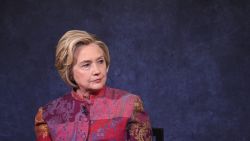Story highlights
Clinton and Trump both jumped into politics with their reactions to the EgyptAir crash
Trump sent an early-morning tweet pointing to terrorism as the cause
'I have concluded that he is not qualified to be President of the United States,' Clinton said of Trump
The tragic disappearance of an EgyptAir jet set off a fierce political clash between Donald Trump and Hillary Clinton on how to fight terror and who is fit to be president.
The exchanges, unfolding less than 24 hours after the plane vanished, demonstrated the divergent political instincts and national security visions of two people poised for a general election clash this fall.
Trump was quick to take to social media – before many details began to emerge about the loss of the plane carrying 66 people from Paris to Cairo. Clinton struck a more cautious approach, waiting until early afternoon to speak. Both went straight to politics. Trump declared terrorism was likely to blame and implied that a “sickness” within Islam and U.S. weakness were the underlying cause. Clinton delivered her most explicit warning yet that Trump’s rhetoric and foreign policy positions make him unfit to serve in the White House.
“I have concluded that he is not qualified to be President of the United States,” Clinton told CNN’s Chris Cuomo in an interview.
True to his campaign creed that if he is attacked, he will hit back twice as hard, the presumptive Republican nominee issued a statement Thursday evening saying that she is the one unfit for the Oval Office.
“Look at the carnage all over the world including the World Trade Center, San Bernardino, Paris, the USS Cole, Brussels and an unlimited number of other places. She and our totally ignorant President won’t even use the term Radical Islamic Terrorism,” Trump said.
“And by the way, ask Hillary who blew up the plane last night – another terrible, but preventable tragedy. She has bad judgment and is unfit to serve as President at this delicate and difficult time in our country’s history.”
Their back-and-forth could foreshadow the political and temperamental reflexes of each candidate in the event of any “October Surprise” style attack against Americans. They also provide hints on how Clinton and Trump would behave in office and reveal the leadership vulnerabilities that each candidate believes could undermine the other in what is already a deeply personal campaign.
An early morning tweet
Trump reacted to the EgyptAir crash by characteristically ignoring standard political practice that would suggest waiting for the facts before firing off an opinion and chose a social media account rather than a formal presidential-style setting to vent.
It was 6:27 a.m. when Americans on the East Coast were waking to hear about the overnight disappearance and Trump – in the latest example of his shoot-from-the-tweet foreign policy – declared the incident was probably terrorism without waiting for any official word to validate his conclusions from U.S. and Egyptian authorities.
“Looks like yet another terrorist attack. Airplane departed from Paris. When will we get tough, smart and vigilant? Great hate and sickness!” Trump wrote on Twitter, automatically turning the crash into a political issue.
Within a few hours, Egyptian Civil Aviation Minister Sharif Fathi said the cause of the flight’s disappearance was more likely to be related to terrorism than a technical issue. By mid afternoon, Trump’s tweet garnered more than 9,000 retweets and 24,000 likes.
The billionaire’s quick response to the tragedy epitomized a campaign style that has ripped up political conventions, injecting his views directly into the social media bloodstream of the news industry and himself into the developing crisis.
It also reflected a worldview that sees the United States as insufficiently ruthless in prosecuting terrorism: Trump has for instance suggested he would reintroduce waterboarding and kill the families of suspected terrorists.
Later, Trump issued his statement and also sharpened his tone on the disaster at a fundraiser for New Jersey Gov. Chris Christie – signaling he had no tolerance for criticisms that he had lashed out over the tragedy before learning the facts.
“A plane got blown out of the sky. And if anyone doesn’t think it was blown out of the sky, you’re 100% wrong,” he said.
Clinton: Trump makes fighting terror more difficult
Where Trump was characteristically impulsive, Clinton was more cautious, waiting until until U.S. and Egyptian officials were openly saying that terrorism was the most probable cause of the crash before delivering her response.
“It does appear that it was an act of terrorism, exactly how of course the investigation will have to determine. It once again shines a very bright light on the threats that we face from organized terror groups,” Clinton told Cuomo.
Clinton, as she did after the terror attacks in Paris last November, positioned herself as uniquely able to offer “smart, steady” leadership needed after such tragedies – striking a clear contrast with Trump’s impulsive style.
Showing her internationalist instincts and tendency to reach for policy solutions in a time of crisis, the former secretary of state proposed a multi-national commitment to redouble the struggle against terrorism, pushed European nations to do more and recommended probes of how aviation security could be further improved.
At the same time, she made some political hay, arguing that Trump’s anti-Muslim rhetoric and unpredictable response to suddenly developing international crises like the EgyptAir crash proved he was disastrously unsuited to the presidency.
“He says a lot of things that are provocative that actually make the important task of building this coalition, bringing everybody to the table, and defeating terrorism more difficult,” Clinton said on CNN.

She argued that Trump’s “wrongheaded” comments on Muslims would deter moderate Muslim nations from helping U.S. anti-terror efforts, and effectively worked as a recruiting tool for radical Islamic groups.
And widening her critique of Trump’s foreign policy, she accused him of attacking “our closest ally, Great Britain. He has praised the reckless dictator in North Korea. He has said we should pull out of NATO, our strongest military alliance. He has advocated for more countries having nuclear weapons.”
“If you go through many of his irresponsible, dangerous, reckless comments … this is a pattern,” Clinton said. “It is a pattern that adds up in my opinion having watched presidents … I have concluded that he is not qualified to be President of the United States.”
Will approach hurt Trump?
Polls show that the clash of temperament and personality revealed between Clinton and Trump following the EgyptAir crash could be a potent ingredient in November’s election.
A Quinnipiac University survey of swing states Florida, Ohio and Pennsylvania last week showed that by 6%, 5% and 1% in each state respectively, voters trusted Trump more than Clinton to deal with terrorism.
But the same survey gave Clinton leads of 20% when voters were asked whether she or Trump had the temperament and quality to handle an international crisis.
The Clinton campaign hopes to frame the election as a choice between their candidate’s skills, knowledge, temperament and experience and what they see as Trump’s ill-considered, intemperate and ill-informed views.
It is a contrast they hope to make before tens of millions of Americans in what are already shaping up to be blockbuster presidential debates in the fall.
For Trump critics, his rush to judgment is sure to exacerbate concerns that he lacks the cool temperament, national security instincts and experience demanded of a commander-in-chief.
After all, American presidents learn to weigh their words carefully, conscious of their impact around the world, and do not typically make such unequivocal comments about tragedies until evidence points to terrorism.
The intriguing question left unanswered is whether Trump’s impulsive response to the EgyptAir story represents merely a political gambit or a genuine preview of how he might part company with tradition and behave as president. Once Trump starts getting intelligence briefings that are offered to candidates following their party conventions, he will be watched to see if armed with in-depth knowledge of global events, his tone will become more temperate. And should he win the presidency, his comments and rhetoric will be judged by a more exacting standard than if he is merely a candidate.
Yet, as a political strategy, Trump’s early morning blast carried very little risk.
Trump’s early call on the plane crash gels with a Republican narrative that has festered since the attack on the U.S. consulate in Benghazi in 2012 that the billionaire has picked up – that Democrats are notoriously loath to pronounce attacks terrorism and do not understand the scale of the terrorist threat or refuse to describe them as such to avoid offending Muslims.
If it is confirmed that terrorists brought down the plane, he can claim his instincts were right and more finely tuned to the threats facing Americans than those of Clinton.
Even if mechanical failure is fingered as the cause of the crash, Trump is unlikely to pay a political price once the news cycle moves on. And Trump can still argue that the underlying concern about terrorism has not abated.
“I guess if you are saying Donald Trump is prescient and saw something a few hours before other people saw it, that would be a compliment,” senior Trump adviser Stephen Miller told CNN’s Brooke Baldwin.
CNN’s Ashley Killough contributed to this report.




















